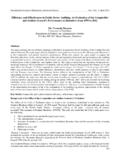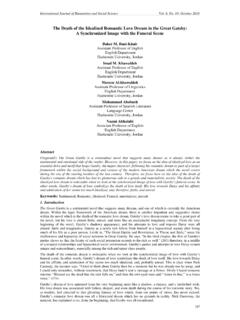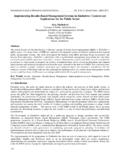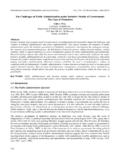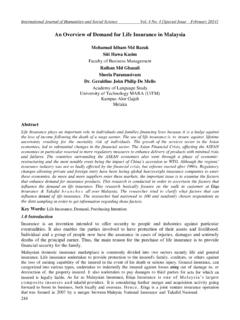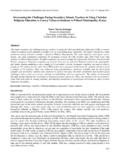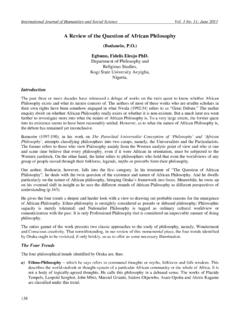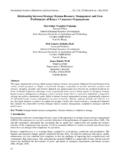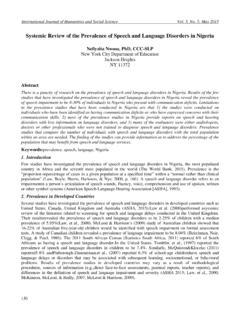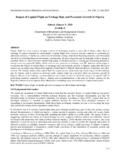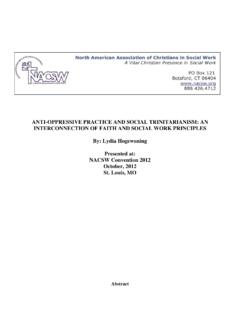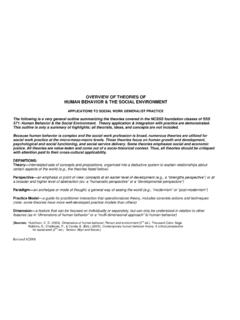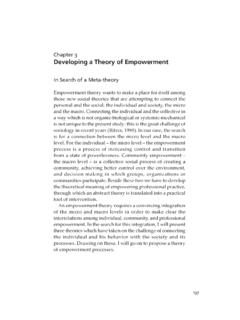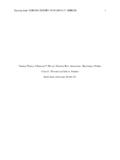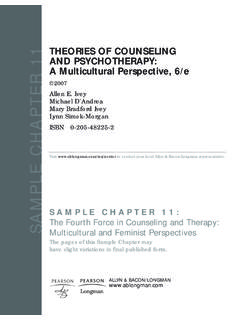Transcription of Toward a Theory of Emancipation: Feminist Critiques of ...
1 International Journal of Humanities and social Science Vol. 4, No. 6; April 2014 203 Toward a Theory of emancipation : Feminist Critiques of postmodernism Patti Nyman, Student Graduate Programme in social and Political Thought York University, Canada Abstract This paper addresses the relationship between the theoretical and practical methods and goals of feminists and postmodernists. It specifically addresses whether the foundational ideas of postmodernist philosophy undermine the emancipatory concerns of women.
2 Through evaluating two of the defining theses of postmodernist philosophy, namely, the Death of Man and the Death of History, I argue that the strong version of the postmodernist critique of the concepts of subjectivity and history is incompatible with the social criticism central to feminism. In opposition to the view that deems these concepts as necessarily androcentric and in need of thorough abandonment, I show that what is required is a re-appropriation that takes into account the situatedness of the subject and the often non-unitary nature of historical narrative.
3 Key Words: feminism, postmodernism , social criticism, subjectivity, meta-narrative, emancipation 1. Can feminism be postmodernist and still retain an interest in emancipation ? In social Criticism without Philosophy: An Encounter between Feminism and postmodernism Nancy Fraser and Linda Nicholson (1990) discuss how the insights of feminists and postmodernists can inform each other in such a way as to create a postmodern feminism that accentuates the strengths of both theories while eliminating their weaknesses.
4 Specifically, a postmodernist reflection on feminism reveals its inherent and often self-defeating use of essentialism, while a Feminist reflection on postmodernism reveals its inherent androcentrism and political na vet . The assumption is that the tendency of postmodernist thinkers to practice critique only within the institution of Philosophy results in their remaining apolitical in the context of a political reality of oppression. However, the question arises as to whether the distance offered by an apolitical philosophy to dominant political interests is one that may work in favour of the Feminist goal of the emancipation of women.
5 The possibility of a reference to knowledge and truth outside of politics may potentially be in favour of the emancipatory concerns of women in that it promotes an independent authority to legitimate knowledge and political claims that resistsbeing subsumed under dominant political interests. This paper will explore this question by evaluating two of the defining theses of postmodernist philosophy, namely, the Death of Man and the Death of History, as illustrated by Jane Flax in Thinking Fragments: Psychoanalysis, Feminism, and postmodernism in the Contemporary Westand Seyla Benhabib (1995) in Feminism and the Question of postmodernism .
6 I will argue along with Benhabib that the strong version of the postmodernist critique of the concepts of subjectivity and history is incompatible with the social criticism central to feminism. In opposition to the view that deems these concepts as necessarily androcentric and in need of thorough abandonment, what is required is a re-appropriation that takes into account the situatedness of the subject and the often non-unitary nature of historical narrative. 2. Defining feminism and postmodernism : the risk of essentialism Before examining the aforementioned theses a few concerns regarding method and terminology must be noted.
7 It can be difficult to pinpoint a defining theme of the whole of feminism or to locate what constitutes the Feminist standpoint as doing so may entail the suppression of particular voices and experiences. Flax (1990) claims that in searching for a cause or core of gender relations or male domination we run the risk of reflecting the very mode of thinking defined by the dominant paradigm itself (p. 28). Yet, we must validate the authority, coherence, and universality of our own standpoint, which thus runs the risk of excluding standpoints unlike our own (p.)
8 28). Center for Promoting Ideas, USA 204 Furthermore, any attempt to define feminism in general risks falling into the forms of essentialism and over-generalization that feminists rightly remain intent on deconstructing, but to cease to do Theory at all or to be paralyzed for fear of proceeding from our own standpoint is equally limiting. When seeking to speak from the standpoint of women in general we may shed light on some aspects of society that may have been suppressed by dominant perspectives but it remains impossible for anyone to speak on behalf of women in general because no woman exists outside of a specific location of gender relations.
9 This lesson is part of what feminists have learned from postmodernists: to cease the search for an Archimedean point to legitimate knowledge claims, to carefully consider those knowledge claims that purport to be neutral or absolute, and to evaluate the interconnections between knowledge claims and power (p. 27). Though the work of feminists and postmodernists can at times be complementary, they are also contradictory. Similar to feminism, postmodernism cannot be treated uniformly, though it tends to have a common object of criticism, the European Enlightenment.
10 White western Feminist and postmodernist discourses are often centered around criticisms of the institution of traditional western philosophy and both seek to develop new forms of social criticism that do not rely solely on the traditional philosophical foundation established in the West. In short, both feminists and postmodernists attempt to reconstruct the relationship between philosophy and social Theory (Fraser & Nicholson, 1990, p. 19). The discourses are deconstructive in the sense that they foster skepticism about ideas concerning truth, knowledge, power, history, self, and language that are often taken for granted within and serve as legitimations for contemporary Western culture (Flax, 1990, ).
